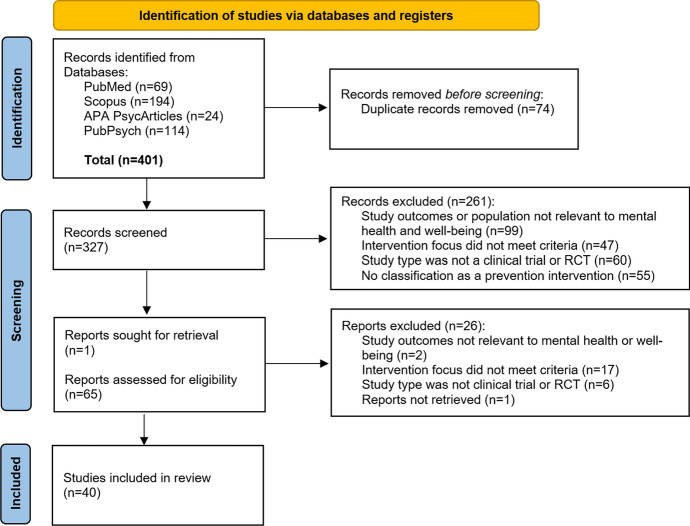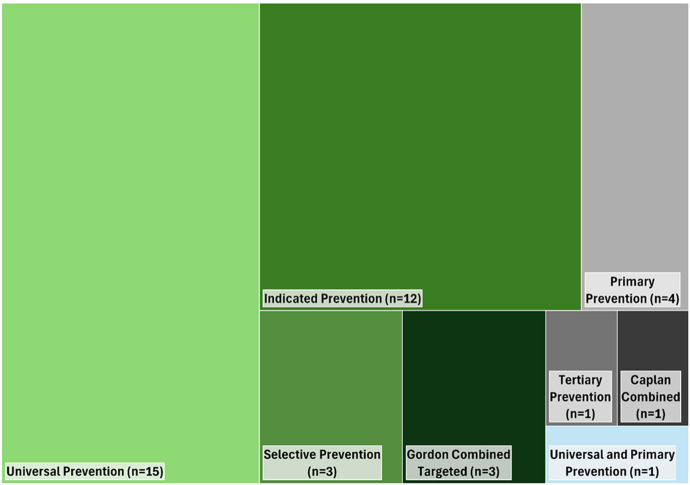心理健康预防分类的范围审查:审查卡普兰和戈登预防框架的应用(2018-2024 年)。
摘要
由于COVID-19大流行、气候变化、经济不稳定和武装冲突等全球危机加剧了精神障碍负担的增加,精神卫生预防成为全球优先事项。这些危机使我们更加需要制定有效的预防战略,处理不同生命阶段和不同人群的心理健康问题。为了构建和分类这些策略,Caplan和Gordon的框架被广泛使用,其中一个关注疾病进展,另一个关注人口风险。虽然这两个框架经常用于心理健康预防,但它们在临床试验中的应用仍未得到探索。本综述通过检查Caplan和Gordon的框架如何应用于心理健康预防,确定研究空白,并探索其联合应用以增强预防策略的潜力来解决这一差距。根据PRISMA-ScR指南进行了范围审查。根据预先确定的标准选择研究,并对数据进行综合。该搜索涵盖了PubMed、Scopus、APA PsycArticles和PubPsych,涵盖了2018年至2024年间以英语或德语发表的同行评审临床试验,包括随机对照试验。符合条件的研究根据Caplan框架对干预措施进行分类,Caplan框架侧重于疾病分期(初级、二级、三级),或Gordon框架根据人群风险(普遍、选择性、指示性)对预防进行分类。研究必须侧重于心理健康预防,包括与心理健康和福祉相关的人群,并报告心理健康或福祉结果。在纳入的40项研究中,6项应用了卡普兰的框架,30项应用了戈登的框架,3项使用了基于戈登方法的改良分类。一项研究应用了这两个框架,强调它们的互补使用是罕见的。研究在19个国家进行,其中德国(n = 8)、美国(n = 8)和荷兰(n = 6)的数量最多,横跨四大洲(亚洲,n = 5;澳大利亚,n = 5;欧洲,n = 22;北美,n = 8)。Gordon框架的应用更为频繁,特别是在普遍预防(n = 15)和指示预防(n = 12)中,而Caplan框架主要用于一级预防(n = 4)。抑郁(n = 25)、焦虑(n = 21)、压力(n = 8)和一般心理健康(n = 8)是最常见的评估结果。这些研究针对不同的人群,包括儿童(n = 7)、青少年(n = 8)、儿童和青少年(n = 1)、父母及其子女或青少年(n = 2)、大学生(n = 6)、在职成年人(n = 7)、老年人(n = 1)和成年人(n = 8),但没有具体说明(n = 8)。这篇综述强调了在心理健康干预中整合卡普兰和戈登框架的潜力未被充分利用。两个应用实例说明了如何将这些框架结合起来更有效地构建预防战略。未来的研究应探讨将这些框架结合起来,以加强预防战略和应对新出现的全球卫生挑战。


Mental health prevention is a global priority owing to the increasing burden of mental disorders exacerbated by global crises such as the COVID-19 pandemic, climate change, economic instability, and armed conflicts. These crises have heightened the need for effective preventive strategies addressing mental health across different life stages and populations. To structure and classify such strategies, Caplan's and Gordon's frameworks have been widely used, with one focusing on disease progression and the other on population risk. Although both frameworks are frequently used in mental health prevention, their application in clinical trials remains unexplored. This review addresses this gap by examining how Caplan's and Gordon's frameworks have been applied in mental health prevention, identifying research gaps, and exploring their potential for their combined application to enhance prevention strategies. A scoping review was conducted following PRISMA-ScR guidelines. Studies were selected based on predefined criteria and the data were synthesized. The search spanned PubMed, Scopus, APA PsycArticles, and PubPsych, covering peer-reviewed clinical trials, including randomized controlled trials, published between 2018 and 2024 in English or German. Eligible studies classified interventions based on Caplan's framework, which focuses on disease stage (primary, secondary, tertiary), or Gordon's framework, which categorizes prevention by population risk (universal, selective, indicated). Studies had to focus on mental health prevention, include populations relevant to mental health and well-being, and report mental health or well-being outcomes. Of the 40 included studies, six applied Caplan's framework, 30 applied Gordon's framework and three used a modified classification based on Gordon's approach. One study applied both frameworks, highlighting that their complementary use is rare. Studies were conducted in 19 countries, with the highest number from Germany (n = 8), the USA (n = 8), and the Netherlands (n = 6), across four continents (Asia, n = 5; Australia, n = 5; Europe, n = 22; North America, n = 8). Gordon's framework was applied more frequently, particularly in universal (n = 15) and indicated prevention (n = 12), while Caplan's framework was used mainly in primary prevention (n = 4). Depression (n = 25), anxiety (n = 21), stress (n = 8), and general mental health (n = 8) were the most frequently assessed outcomes. The studies targeted diverse populations, including children (n = 7), adolescents (n = 8), children and adolescents (n = 1) parents and their children or adolescents (n = 2), university students (n = 6), working adults (n = 7), older adults (n = 1), and adults without specifying (n = 8). This review highlights the underutilized potential of integrating Caplan's and Gordon's frameworks in mental health interventions. Two application examples illustrate how these frameworks can be combined to structure prevention strategies more effectively. Future research should explore combining these frameworks to enhance prevention strategies and address the emerging global health challenges.

 求助内容:
求助内容: 应助结果提醒方式:
应助结果提醒方式:


